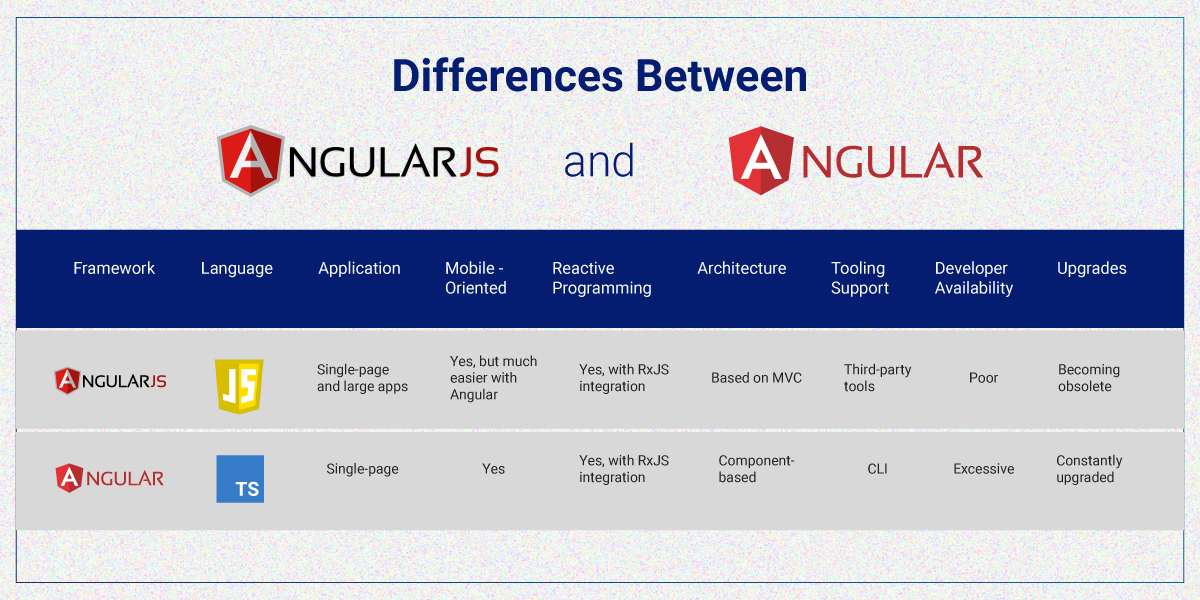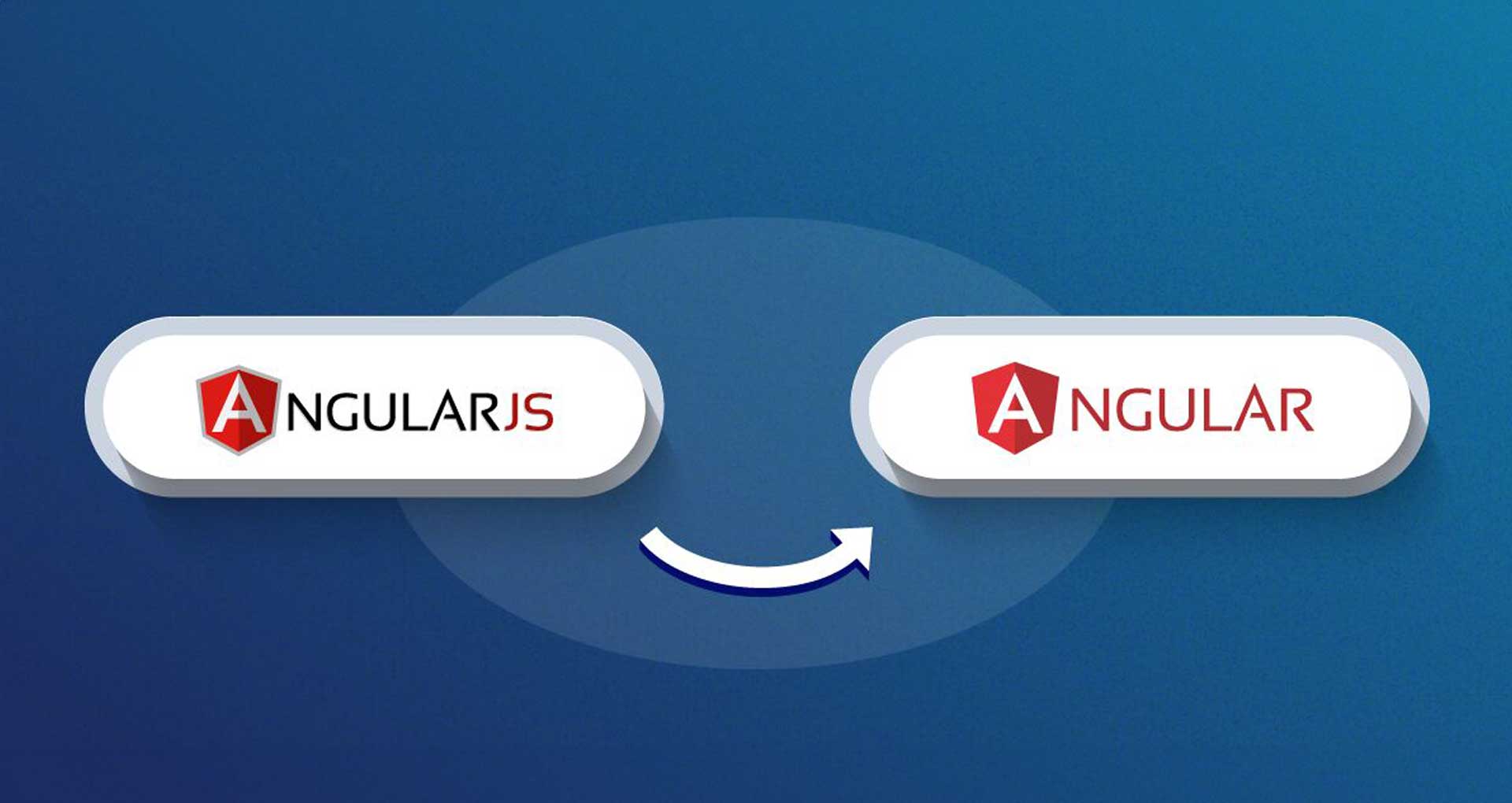Angular is one of the most popular frameworks today to create applications for both mobile and desktop devices. Since its introduction in 2016, it has grown to become a favorite among both front & back-end developers. This is because of its features & advanced capabilities that make the code structured and more efficient.
And in the last couple of years, the migration from Angular JS to Angular has become one of the important topics in tech communities. The important reason for them all was since Dec 2021, the AngularJS team has suspended the support for the framework completely, including critical security fixes. Therefore, it is high time for many businesses to update applications that are using AngularJS
However, moving from AngularJS to Angular or even understanding the concept might sound complex. And, business leaders need to know why & how we can help migrate AngularJS to Angular (latest version). Here we’ll break it down for you & answer all your questions.
But first things first what happened to AngularJS, and why are we talking about migrating to Angular?
Reasons to Migrate from AngularJS to Angular
Well, one possibility could be as the demand continued to grow bigger the core developers improved everything that they could and now have hit the wall. And a new framework had to be created to fill the shoes of new requirements for application development. Even if you know that both the frameworks are quite different, that does not fully explain why to migrate. Let’s try to explore different points between two frameworks across various parameters.
- Architecture: AngularJS had notions of scope and controllers, which were relatively rigid and less reusable. Angular today uses an MVC (model-view-controller) architecture based on a hierarchy of components and services. It allows the reuse of the elements while improving their testability and maintainability. It is more preferred for building a dynamic user interface for an application.
- Structure: When introduced AngularJS was flexible but less stable yet manageable. Angular imposes a structured, component-based approach – offers a precise way of exchanging data between components. A clean code structure would include features like better dependency injection than Angular JS, and therefore more efficient development. Thus, creating and maintaining larger applications is seamless with the most recent Angular version.
- Language: Back in the days with Javascript AngularJS was making the process of project-set up easy. However, due to the absence of the type-checking feature, compile-time errors used to go unnoticed. Angular, on the other hand, benefits from the consistency and flexibility of the TypeScript language. It helps optimize the code, reduce runtime errors, and work across multiple platforms. Moreover, TypeScript offers backward compatibility with Javascript that offers higher security and helps identify errors at an early stage while writing the code.
- Mobile Support: With AngularJS even today you can build dynamic web pages it would lack support for mobile browsers. However, Angular offers support across mobile devices & browsers. Therefore, the migration ensures support for most kinds of mobile browsers and devices. Further, it can be conveniently used to even build native mobile applications. That’s why more leaders are opting to migrate for their business applications.
- Material Design: Google’s popular Material Design Specification was first introduced with AngularJS. It offered support from 2014 through 2017, though it was limited to Angular JS 1.x. However, a significant update in the form of TypeScript-based material design called Angular Material, today helps implement responsive design smoothly. Interestingly, it is more extensible than its predecessor.
- Speed: AngularJS used to be an efficient framework. However, the code-base was sluggish in the case of large applications due to a higher number of scopes and bindings. Angular’s support for component-based architecture makes it run much faster than AngularJS. Additionally, with a more advanced data binding, it also eliminates the slower, two-way binding.
- Tooling Support: AngularJS relied upon third-party tools like IDE or Webstorm. However, Angular benefits from the Command-Line-Interface (CLI) which reduces the time spent on creating the application. It helps develop projects where development teams can include Angular entities such as files, or more specific to Angular objects like components, modules, services, and directives.
- Updates: Angular aims to provide developers with maximum stability for critical applications. Therefore, the Angular team decided to use a time-based publishing cycle with semantic versioning. A time-based publishing cycle means that we can expect new versions of Angular every six months.
To put things into perspective, here’s a look at the key differences between AngularJS and Angular.

Now that we’ve understood the technical benefits, let’s look at some of the benefits from a business standpoint.
Business Benefits of Migrating from AngularJS to Angular
Listed below are three core benefits according to us that an organization can leverage with this movement.
- Mobile-Driven Approach: Angular allows developers to build lightweight applications that offer faster downloads. And, this is one of the many reasons why Angular utilizes “lazy scripting”. This means that it would load particular modules only when needed. On top of that, some packages (for example, animations) are taken out from the main Angular core. This enabled lighter and faster performance.
- Code Optimization: Angular uses TypeScript language which is a superset of ECMAScript 6 (ES6) and it has an advanced type-checking feature. This implies that mistakes can be noticed before they happen. Therefore, developers can build large applications and avoid compile-time errors.
- Ease of Maintenance: Angular has an architecture based on components or services, in other words — modules. The module enables the organization of application functionalities by separating them into reusable pieces of data. Each piece is responsible for one feature that stays independent with its system and APIs. And, all the above point ensures easier maintenance when development teams can swap one component with another without rewriting the entire code.
- Cost Optimization: Angular enables making the development process more productive because of CLI. And, reduced development time leads to fewer costs – as the developers spend lesser time on coding and testing. This is because their dependency on third-party tools like WebStorm or Brackets is completed eliminated. It even helps simplify maintenance and debugging. And, finally, every saved cost adds up to the massive savings at end of the day.
Rishabh’s Take on Migration from AngularJS to Angular
When moving from one framework to another, you need to know that some apps may need to be re-written, while some may require only an update. At Rishabh, we can help you seamlessly upgrade to the latest version with our Angular Development Services focus.
Here’s Our Approach for Moving from AngularJS to Angular
This move is no easy feat since it has a huge impact on both your business & service delivery. The upgrade exercise would require an entire team who can help you analyze your business requirements, goals & software to design a detailed strategy.
- Set Up TypeScript: We begin by using the @types/angular package & ensure that the TypeScript is interoperable with the old JavaScript. We make this possible by using the TypeScript Compiler & TypeScript module integration.
- Create a New Build: Leveraging Angular CLI, we help you create a new build of your legacy app. When copying the AngularJS files to a new folder in Angular, the features are automatically connected.
- Utilize the ngUpgrade Toolkit: Here we implement a hybrid update and operate two frameworks at the same time to ease the migration process.
- Transfer Services & Components: We use the downgrade components to make Angular’s components available within the AngularJS part of the project. Additionally, to successfully migrate to the latest version of Angular, we re-write some parts of the code.
- Utilize UI-Router: Routing is the final stage where ngUpgrade makes this process possible by default & UI-Router for a smooth migration.
Final Words
The AngularJS to Angular migration is indeed a big step that requires much effort. However, there’s no doubt about whether an organization should go about it or not. As discussed above, Angular is advantageous in many ways as it would allow the applications to perform better and work faster. Also, it’ll make the developed solutions easier to scale and maintain. Finally, goes without saying that the forthcoming versions of Angular won’t let the systems become outdated or irrelevant. So, what’re you waiting for? Plan your migration exercise ASAP to leverage the benefits sooner.








